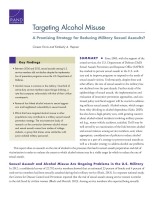| 来源类型 | Research Reports
|
| 规范类型 | 报告
|
| 来源ID | RR-538-OSD
|
| Targeting Alcohol Misuse: A Promising Strategy for Reducing Military Sexual Assaults? |
| Coreen Farris; Kimberly A. Hepner
|
| 发表日期 | 2014
|
| 出版年 | 2014
|
| 页码 | 24
|
| 语种 | 英语
|
| 结论 |
Sexual Assault and Alcohol Misuse Are Ongoing Problems in the U.S. Military- Sexual assaults among U.S. service members have not declined despite the implementation of prevention programs across the U.S. Department of Defense (DoD).
- Alcohol misuse is common in the military: One-third of active-duty service members report binge drinking, a rate that compares unfavorably with that of their civilian counterparts.
Alcohol Abuse Has Been Linked to Sexual Aggression and Heightened Vulnerability to Sexual Assault- Studies show that alcohol use is causally linked to increased aggression in young men — particularly among men who are predisposed to behaving aggressively — and that may include an increased risk of sexual aggression.
- Alcohol intoxication increases the risk that men will misperceive women's sexual intent, which, in turn, is linked with an increased likelihood of sexual assault perpetration.
- Sexual assault victimization occurs as a result of someone else's actions rather than something the victim does. Thus, alcohol increases vulnerability only in a setting with a nearby potential perpetrator.
- When this condition is met, alcohol can have a range of effects on the risk of victimization — from a reduced awareness of risk indicators to incapacitation or unconsciousness.
Efforts That Target Alcohol Misuse May Contribute to a Military Sexual Assault Prevention Strategy- The most extensive body of research on the connection between alcohol misuse and sexual assault comes from studies of college students, a group that shares some similarities with junior enlisted military personnel.
- DoD efforts to reduce sexual assault in the military could benefit from findings from these studies, including evidence of what is effective and what is not.
|
| 摘要 |
- DoD should sponsor research to identify connections between alcohol misuse and sexual assault in the military context. For example, available data on military sexual assaults do not provide the detail necessary to determine who was using alcohol (the perpetrator, the victim, or both), the amount of alcohol consumed, or the role of alcohol in the assault.
- In addition to its continued efforts to evaluate military sexual assault prevention programs, DoD should invest in research on alcohol misuse prevention programming as a strategy by which to also prevent military sexual assaults. Civilian research suggests that prevention programs focused on reducing alcohol misuse also reduce the incidence of sexual assault. Such a link may be true for military sexual assaults as well.
- To conduct valid effectiveness trials, decisionmakers should first implement novel programs at selected bases rather than service-wide. Although there may be pressure to roll out programs universally, doing so would preclude an evaluation of effectiveness, as there would be no appropriate comparison group by which to benchmark the effect of the program on the incidence of sexual assault.
|
| 主题 | Alcohol
; Crime and Violence Prevention
; Military Personnel
; Sexual Assault
; Substance Abuse
; Substance Abuse Prevention
|
| URL | https://www.rand.org/pubs/research_reports/RR538.html
|
| 来源智库 | RAND Corporation (United States)
|
| 资源类型 | 智库出版物
|
| 条目标识符 | http://119.78.100.153/handle/2XGU8XDN/107794
|
推荐引用方式
GB/T 7714 |
Coreen Farris,Kimberly A. Hepner. Targeting Alcohol Misuse: A Promising Strategy for Reducing Military Sexual Assaults?. 2014.
|
|
文件名:
|
x1495316358161.jpg
|
|
格式:
|
JPEG
|

|
文件名:
|
RAND_RR538.pdf
|
|
格式:
|
Adobe PDF
|
除非特别说明,本系统中所有内容都受版权保护,并保留所有权利。